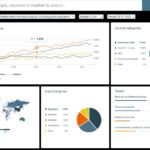As your furry friend gazes at you during meal times, it’s natural to wonder what you can safely share. While some human foods are perfectly fine for dogs, others can be dangerous, even toxic. Knowing What Foods Are Dogs Not Allowed To Eat is crucial for their health and well-being. This guide will cover common foods that should be strictly avoided.
Foods That Are Toxic to Dogs: Immediate Vet Attention Required
If your dog ingests any of the following items, contact your veterinarian immediately. Prompt action can significantly improve the outcome.
1. Chocolate, Coffee, and Caffeine: A Dangerous Trio
These contain methylxanthines, found in cacao seeds. These substances are highly toxic to dogs. Ingestion can lead to:
- Vomiting
- Diarrhea
- Hyperactivity
- Cardiac issues
- Tremors
- Seizures
- Death
The severity depends on the dose; smaller dogs and those consuming larger amounts are at higher risk. Dark chocolate is more dangerous than milk chocolate due to its higher methylxanthine content. Baking chocolate poses the greatest threat.
If your dog consumes chocolate, coffee, or caffeine, seek veterinary care immediately.
2. Xylitol: A Sweetener to Avoid
Xylitol, an artificial sweetener found in candies, gum, and toothpaste, is incredibly toxic to dogs.
Xylitol triggers insulin release, which can cause a rapid drop in blood sugar (hypoglycemia) and potentially lead to liver failure. Symptoms include vomiting, seizures, lethargy, and loss of coordination.
3. Macadamia Nuts: Small but Harmful
Macadamia nuts, while delicious to humans, should never be given to dogs.
The exact toxic component is unknown, but even small amounts can cause weakness, vomiting, tremors, depression, and elevated body temperature.
4. Grapes and Raisins: A Kidney Threat
Grapes and raisins can cause fatal kidney failure in dogs. The exact toxin is unidentified, and even dogs that have previously eaten them safely can suddenly be poisoned.
It’s best to consider grapes and raisins toxic and avoid them completely.
5. Garlic, Onions, and Chives: An Allium Family Warning
While cats are more susceptible, dogs can also be affected by Allium species such as garlic, onions, chives, leeks, and related plants.
Sulfur-containing compounds in these plants damage red blood cells, leading to Heinz body anemia. Symptoms include weakness, exercise intolerance, depression, vomiting, diarrhea, changes in respiratory and heart rate, red urine, collapse, and potentially death.
6. Alcohol: Never a Treat
While most dogs dislike the taste of alcohol, some may ingest it if offered. Alcohol can cause vomiting, diarrhea, breathing difficulties, loss of coordination, tremors, coma, and even death in dogs.
Keep all alcoholic beverages and products containing alcohol out of reach.
7. Yeast Dough: A Rising Danger
While fully baked bread is generally safe, yeast dough can cause significant problems. It can cause gas to accumulate in the intestinal tract, leading to pain and potentially fatal gastric bloat and torsion (GDV).
Additionally, yeast produces ethanol, which can cause alcohol intoxication. Even small amounts of dough can be problematic.
Other Foods That Are Dangerous for Dogs: Proceed with Caution
While these foods may not be strictly toxic, they can still cause health problems. It’s best to avoid them or offer them very sparingly. If your dog shows signs of illness after eating any of these, contact your veterinarian.
1. Milk and Dairy Products: Not Always a Good Choice
Many dairy products are high in fat, which can cause gastrointestinal upset and trigger pancreatitis, a serious and potentially fatal condition.
Many dogs are also lactose intolerant, lacking the enzyme lactase to break down sugars in dairy products. This can lead to vomiting, diarrhea, and other gastrointestinal issues.
2. Salt and Salty Snacks: Moderation is Key
Large amounts of salt are toxic, but most dogs won’t consume enough to be poisoned. However, dogs with high blood pressure, heart, or kidney disease are more sensitive to salt’s effects.
Salty foods can cause excessive thirst and urination, vomiting, diarrhea, and depression. In severe cases, tremors, seizures, and death can occur. Occasional small amounts are unlikely to be harmful, but salty snacks shouldn’t be a regular part of your dog’s diet.
3. Raw Meat, Raw Eggs, and Bones: Risks Outweigh Benefits
Raw meat and eggs can contain bacteria like Salmonella and E. coli, which can make your dog (and you) sick.
Raw eggs contain avidin, which can interfere with B vitamin absorption, leading to skin and coat problems.
Bones can cause choking, intestinal blockage, or intestinal perforation.
4. Citrus: A Zesty Irritant
In large amounts, the essential oils in citrus fruits can cause gastrointestinal irritation and central nervous system depression. The peels, seeds, and leaves contain the highest concentrations. Small amounts of lemons, limes, and oranges are unlikely to be a problem, but these fruits shouldn’t be a regular part of your dog’s diet.
5. Coconut and Coconut Oil: Possible Digestive Upset
Small amounts of coconut products are unlikely to cause serious harm, but they can trigger diarrhea and gastrointestinal upset. Coconut water is high in potassium, which can cause electrolyte imbalances in dogs with heart or kidney problems.
6. Nuts: Proceed with Caution
Some nuts are safer than others, but all are high in calories and fat, potentially triggering vomiting, diarrhea, and pancreatitis.
Macadamia nuts and black walnuts are toxic and should be completely avoided. Almonds and pecans are not toxic but should also be avoided due to their high fat content and potential to cause gastrointestinal upset. Other nuts should be fed in limited amounts and only after researching their safety.
What Foods Can Dogs Eat? Safe Options to Consider
Some human foods are generally considered safe for dogs. However, always offer them in small amounts (less than 10% of your pet’s daily calories) and consult your veterinarian first.
Some dog-safe foods include:
- Cooked lean meats (chicken, turkey, beef)
- Certain vegetables (carrots, green beans, cooked sweet potatoes)
- Some fruits (apples without seeds, blueberries)
- Cooked rice
Keep in mind that commercial dog food is formulated to meet your dog’s nutritional needs. Overfeeding human food can disrupt this balance and lead to malnutrition. Stick to safe human foods in small quantities.

